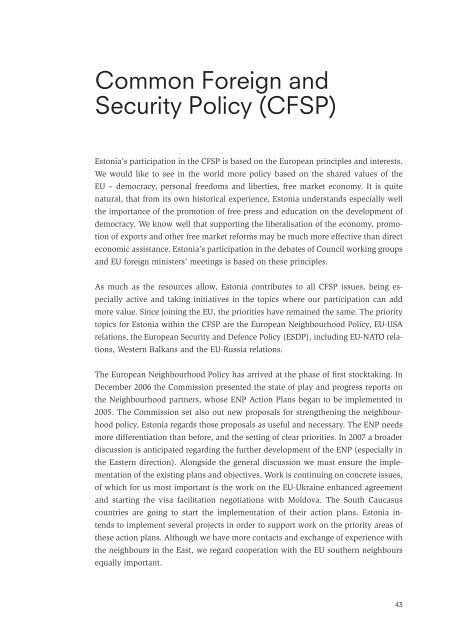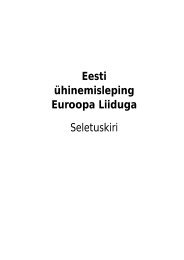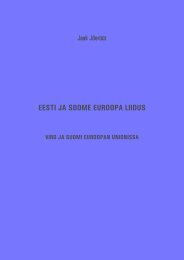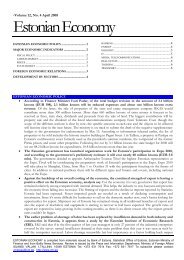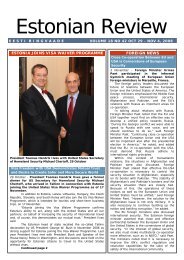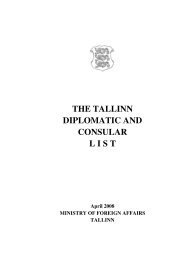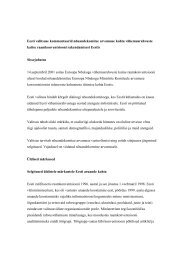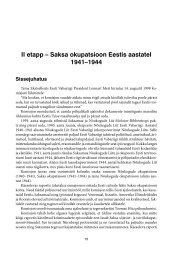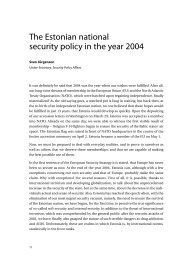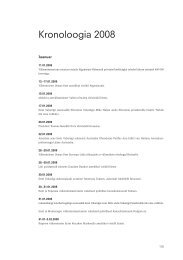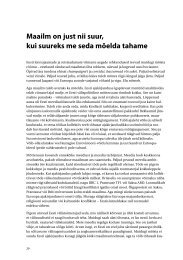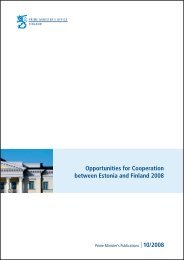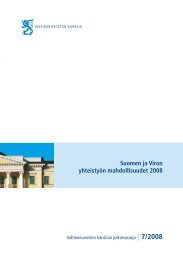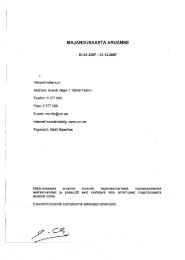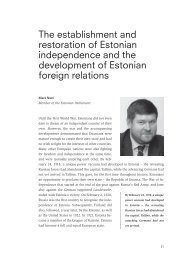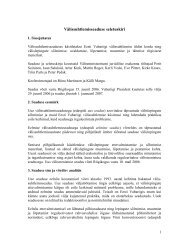Common Foreign and Security Policy (CFSP)
Common Foreign and Security Policy (CFSP)
Common Foreign and Security Policy (CFSP)
Create successful ePaper yourself
Turn your PDF publications into a flip-book with our unique Google optimized e-Paper software.
<strong>Common</strong> <strong>Foreign</strong> <strong>and</strong><br />
<strong>Security</strong> <strong>Policy</strong> (<strong>CFSP</strong>)<br />
Estonia’s participation in the <strong>CFSP</strong> is based on the European principles <strong>and</strong> interests.<br />
We would like to see in the world more policy based on the shared values of the<br />
EU – democracy, personal freedoms <strong>and</strong> liberties, free market economy. It is quite<br />
natural, that from its own historical experience, Estonia underst<strong>and</strong>s especially well<br />
the importance of the promotion of free press <strong>and</strong> education on the development of<br />
democracy. We know well that supporting the liberalisation of the economy, promotion<br />
of exports <strong>and</strong> other free market reforms may be much more effective than direct<br />
economic assistance. Estonia’s participation in the debates of Council working groups<br />
<strong>and</strong> EU foreign ministers’ meetings is based on these principles.<br />
As much as the resources allow, Estonia contributes to all <strong>CFSP</strong> issues, being especially<br />
active <strong>and</strong> taking initiatives in the topics where our participation can add<br />
more value. Since joining the EU, the priorities have remained the same. The priority<br />
topics for Estonia within the <strong>CFSP</strong> are the European Neighbourhood <strong>Policy</strong>, EU-USA<br />
relations, the European <strong>Security</strong> <strong>and</strong> Defence <strong>Policy</strong> (ESDP), including EU-NATO relations,<br />
Western Balkans <strong>and</strong> the EU-Russia relations.<br />
The European Neighbourhood <strong>Policy</strong> has arrived at the phase of first stocktaking. In<br />
December 2006 the Commission presented the state of play <strong>and</strong> progress reports on<br />
the Neighbourhood partners, whose ENP Action Plans began to be implemented in<br />
2005. The Commission set also out new proposals for strengthening the neighbourhood<br />
policy. Estonia regards those proposals as useful <strong>and</strong> necessary. The ENP needs<br />
more differentiation than before, <strong>and</strong> the setting of clear priorities. In 2007 a broader<br />
discussion is anticipated regarding the further development of the ENP (especially in<br />
the Eastern direction). Alongside the general discussion we must ensure the implementation<br />
of the existing plans <strong>and</strong> objectives. Work is continuing on concrete issues,<br />
of which for us most important is the work on the EU-Ukraine enhanced agreement<br />
<strong>and</strong> starting the visa facilitation negotiations with Moldova. The South Caucasus<br />
countries are going to start the implementation of their action plans. Estonia intends<br />
to implement several projects in order to support work on the priority areas of<br />
these action plans. Although we have more contacts <strong>and</strong> exchange of experience with<br />
the neighbours in the East, we regard cooperation with the EU southern neighbours<br />
equally important.<br />
43
2006<br />
ESTONIAN MINISTRY OF FOREIGN AFFAIRS YEARBOOK<br />
Estonia’s relations with Russia form a part of the European Union’s relations with<br />
Russia. Estonia’s goal is to build in cooperation with other EU member states such<br />
a strategic relationship between the EU <strong>and</strong> Russia, which would take into account<br />
Estonia’s national interests <strong>and</strong> would be based on shared values. It is in the interests<br />
of all EU member states to ensure that Russia is democratic <strong>and</strong> that we have a stable<br />
partnership with Russia. We appreciate the work already done to ensure this. One of<br />
the most important issues of the coming years is the work on the new framework<br />
agreement to replace the EU-Russia Partnership <strong>and</strong> Cooperation Agreement (PCA).<br />
The new agreement should be more detailed <strong>and</strong> comprehensive than the existing<br />
one, reflecting the achievements of the last decade <strong>and</strong> giving a realistic frame to<br />
the development. Another important issue for Estonia is the implementation of the<br />
agreement on the four common spaces, signed in May 2005. Many aspects of this<br />
agreement have not yet been implemented. Estonia would like to see the comprehensive<br />
implementation of the four roadmaps, which are based on common values<br />
<strong>and</strong> interests. In the economic sphere the priority areas for Estonia are energy cooperation,<br />
reduction of trade barriers <strong>and</strong> cross-border cooperation. In the space<br />
of freedom, security <strong>and</strong> justice, the facilitation of the registration of foreigners is<br />
a priority. In the space of external security the priority of Estonia is the resolution<br />
of frozen conflicts. The priority of the space of education <strong>and</strong> science is the further<br />
reinforcement of cooperation within the sphere of culture <strong>and</strong> education. A third important,<br />
<strong>and</strong> positive, development has been the signing of the EU-Russia visa facilitation<br />
<strong>and</strong> readmission agreements at the Sochi summit. One of the most important<br />
outcomes of the visa dialogue should be the adoption <strong>and</strong> application by Russia of<br />
the European st<strong>and</strong>ards.<br />
The Western Balkans is important for Estonia, as the countries of this region have<br />
been offered the European perspective. Holding the Balkan countries on the Euro-<br />
Atlantic course by a positive engagement is the only way to achieve stability <strong>and</strong><br />
development in South-Eastern Europe. Estonia has contributed to the efforts to secure<br />
peace <strong>and</strong> stability in the Western Balkans by participating in the international peace<br />
support missions (including ESDP missions) <strong>and</strong> transferring the experience of reforms<br />
<strong>and</strong> accession to the EU <strong>and</strong> NATO. Taking into account the EU perspective of<br />
these countries, including the c<strong>and</strong>idate country status of Macedonia, Estonia has<br />
actively supported the adoption of negotiation m<strong>and</strong>ates to conclude visa facilitation<br />
<strong>and</strong> readmission agreements with Bosnia <strong>and</strong> Herzegovina, Macedonia, Montenegro<br />
<strong>and</strong> Serbia <strong>and</strong> to conclude the visa facilitation agreement with Albania. The negotiations<br />
with these countries were started on 30 November 2006.<br />
The most important issue of 2007 will be the settlement of the status of Kosovo,<br />
transfer of the international coordination to the EU <strong>and</strong> the launch of the EU Kosovo<br />
mission, in which Estonia will definitely take part. The future status of Kosovo must<br />
44
COMMON FOREIGN AND SECURITY POLICY (<strong>CFSP</strong>)<br />
2006<br />
be in line with the EU perspective of Kosovo <strong>and</strong> the Western Balkans. This will entail<br />
the increase of the role of the EU in the future of Kosovo.<br />
Being the first country to conclude diplomatic relations with Montenegro, Estonia<br />
has good opportunities for the fast development of relations with this country, <strong>and</strong><br />
an important role in facilitating Montenegro’s aspirations to become a full member<br />
of the European family.<br />
A strong transatlantic relationship is an important priority for Estonia. The EU <strong>and</strong><br />
NATO share common values, therefore their joint endeavours bear more fruit than<br />
the same efforts undertaken separately. The EU-USA cooperation on promoting democracy,<br />
economic integration over the Atlantic, <strong>and</strong> on energy issues is extremely<br />
important, irrespective of the occasionally emerging disagreements on certain questions.<br />
The EU <strong>and</strong> US are more successful if they work jointly on ensuring democracy<br />
<strong>and</strong> security. No issues should be barred from the discussion of the EU-NATO joint<br />
agenda. Unfortunately this is not always the case.<br />
As said, every member state can not deal with only its national priorities within the<br />
<strong>CFSP</strong>, but has to pay attention also to other issues. Through EU membership Estonia<br />
participates in the broad external activities of the EU. The European Union has set a<br />
goal to be active in all of the world’s hotbeds of crises <strong>and</strong> problematic regions. This<br />
is brought about by the underst<strong>and</strong>ing that in today’s world security risks do not<br />
recognise state frontiers.<br />
The Middle East – both directly the Israeli-Palestinian conflict, as well as the surrounding<br />
countries, also the Persian Gulf countries <strong>and</strong> North Africa – is a region which affects<br />
the political developments virtually in the whole world. The Southern <strong>and</strong> Eastern Mediterranean<br />
is historically an area where the interests of different countries <strong>and</strong> cultures<br />
meet. Underst<strong>and</strong>ably, Estonia can not have a leading role in forming joint positions regarding<br />
this part of the world, but the EU’s role <strong>and</strong> direct activities there have grown.<br />
Estonia takes also part in the Barcelona process. This process is somewhat unique<br />
in the <strong>CFSP</strong> context, by comprising the regular eye-to-eye meetings of the higher officials<br />
of the EU <strong>and</strong> its Southern partners (Egypt, Morocco, Algeria, Syria, Lebanon,<br />
Tunisia, Israel, the Palestinian Authority, Jordan, Turkey). For Estonia this forum is<br />
especially valuable, as it offers possibilities for bilateral contacts. As a result of this<br />
we can rely on information acquired from direct sources, when we formulate our<br />
positions towards the issues of this region. We consider also very valuable the Anna<br />
Lindh Euro-Mediterranean Foundation for Cooperation between Cultures, which was<br />
created one <strong>and</strong> half years ago within the framework of the Euro-Mediterranean partnership<br />
to support projects aimed at a mutual introduction of different cultures.<br />
45
2006<br />
ESTONIAN MINISTRY OF FOREIGN AFFAIRS YEARBOOK<br />
Within the limits of its resources, Estonia participates in the EU election observation<br />
missions. In 2006 Estonian observers participated among others in the elections of<br />
the Palestinian Authority, <strong>and</strong> in the Kongo Democratic Republic.<br />
Estonia continues in the participation of missions in Iraq <strong>and</strong> Afghanistan, which are<br />
not ESDP missions. Yet the EU has been considering increased engagement in these<br />
regions. The EU has created a civil mission to train the Iraqi police <strong>and</strong> is planning a<br />
civil operation in Afghanistan. The EU is also continuing its development aid to both<br />
regions. Estonia supports these endeavours actively <strong>and</strong> regards them as important.<br />
For example, Estonia fully supports the increasing of the role of the EU in the work<br />
to build up Afghanistan <strong>and</strong> we hope that an agreement between the EU members<br />
will be reached to this regard. Having increased in 2006 our military contribution to<br />
Afghanistan, Estonia supports also the creation of a civil ESDP mission (advising the<br />
local police).<br />
There was more active debate in 2006 within the EU over the possibilities to improve<br />
the effectiveness, cohesion <strong>and</strong> visibility of the EU’s external activities in the situation<br />
of the deadlock over the EU Constitutional Treaty. In Estonia’s opinion, more cohesion<br />
can be achieved by drawing up joint food for thought papers by the Council Secretariat<br />
<strong>and</strong> the Commission, appointing double-hatted EU representatives, improving<br />
the cooperation, coordination <strong>and</strong> exchange of information between the Commission,<br />
Council, member states <strong>and</strong> also the European Parliament. Cohesion will be increased<br />
also by closer cross-pillar cooperation (in member states between various ministries<br />
<strong>and</strong> agencies). Examples of areas where this is needed are fight against terrorism <strong>and</strong><br />
justice <strong>and</strong> home affairs (migration, visa issues etc).<br />
An important guarantee of the effectiveness of external activities is the financing of<br />
the <strong>CFSP</strong> according to the real needs. Estonia is satisfied that within the agreement<br />
on the new financial perspective it was possible to achieve a substantial increase<br />
of the <strong>CFSP</strong> budget. Taking into account the fast development of the ESDP <strong>and</strong> the<br />
ambitions of the EU in this sphere, it is important to continue work to increase the<br />
budget.<br />
46


